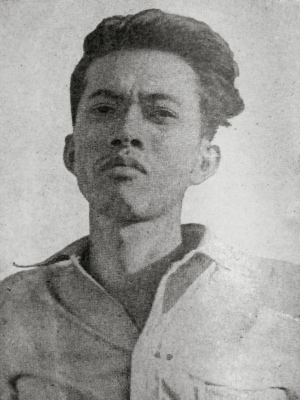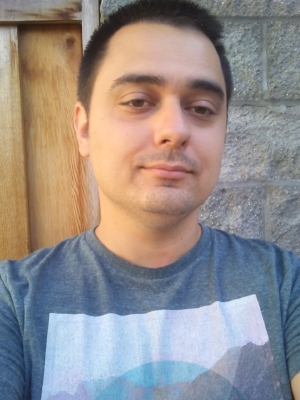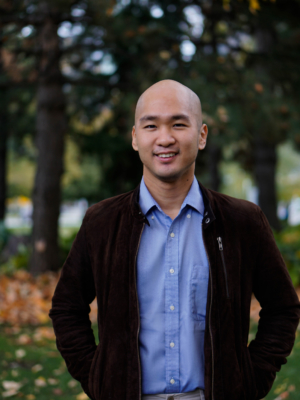Invitation / Memories
[translated poetry]
Invitation
Ida
Pierced the light
The air thick as fog
The black mirror full of moss
Is shatter-scattered now
In an empty airy room
Let’s be happy again
Back to seventeen
Cycling coupled together
We go down this road
Be happy
Don’t care about anything
Sweet delight
Let the rains come
We bathe ourselves sopping
Knowing for sure we’ll soon be dry again.
Ajakan
Ida
Menembus sudah caya
Udara tebal kabut
Kaca hitam lumut
Pecah pencar sekarang
Di ruang lepah lapang
Mari ria lagi
Tujuh belas tahun kembali
Bersepeda sama gandengan
Kita jalani ini jalan
Ria bahgia
Tak acuh apa-apa
Gembira-girang
Biar hujan datang
Kita mandi-basahkan diri
Tahu pasti sebentar kering lagi.
Februari 1943
Memories
to Karinah Moordjono
Sometimes
Between these familiar bars
They yield colours
Worn out things are forgotten
Ah! You feel yourself scatter
Soaring high above the present
A brief moment
Only. Finely fragile these interwoven memories
Break vanish before being held
Shocked
Back to the mundane
The soul asks: Must the fruit
of life fall so often to the ground?
Covered in choked regrets over the ever-wasted
Kenangan
untuk Karinah Moordjono
Kadang
Di antara jeriji itu-itu saja
Mereksmi memberi warna
Benda usang dilupa
Ah! tercebar rasanya diri
Membubung tinggi atas kini
Sejenak
Saja. Halus rapuh ini jalinan kenang
Hancur hilang belum dipegang
Terhentak
Kembali di itu-itu saja
Jiwa bertanya: Dari buah
Hidup kan banyakan jatuh ke tanah?
Menyelubung nyesak penyesalan pernah menyia-nyia
19 April 1943
TRANSLATORS’ NOTE
Chairil Anwar “Invitation” and “Memories” Translator’s Statement
Indonesian (or “Bahasa Indonesia,” literally “Indonesian language”) is the current official language of Indonesia. It started its life as a trade jargon, and until the early 1900’s few Indonesian writers used it for literary purposes, preferring instead the local languages like Javanese or Balinese. However, as a movement for pan-Indonesian national independence grew in the 1930’s and 1940’s, Indonesian seemed a fitting vehicle for communication across the large archipelago. Chairil Anwar is one of the first poets to work in modern Indonesian—a pathbreaker who helped show people the way.
Indonesian’s origin as a trade language has huge consequences for its use in poetry. Like most trade languages, it is very simple, creating a low barrier for new learners. There are no tenses and no singular vs plural divide, and any two nouns can be placed next to each other to create a sentence. The two words, “kucing samudra” can be interpreted as “The cat of the ocean,” “The cat is an ocean,” “The cat that belongs to the ocean,” “The cat, the ocean,” “The cat and the ocean,” and more.
In the two poems above, “Ajakan” (“Invitation”) and “Kenangan” (“Memories”), we have opted to interpret Anwar in a more jagged, fragmented way than we might have. For instance, for “Kenangan,” a previous translator (Burton Raffel) put the opening four lines this way:
Sometimes
On these same old bars
Something withered and forgotten
Bursts in full color. (The Complete Poetry and Prose of Chairil Anwar, 37)
Although this reads as closer to ordinary English, we felt that it ironed out some of the deep peculiarity of the original poem (such as the ambiguous “they”/“mereksmi”). On the other hand, we did opt to read grammatical connections into the poems that we could have left out, such as the “is” in line 5 of “Ajakan.” In Indonesian, “is” is rarely used; instead, subject and predicate are simply placed side by side. So it was up to us whether we wanted to make it explicit or leave it up to the reader. In this case we thought an explicit “is” would be a good idea.
These two poems are about experiences of breakage, moments where consciousness moves from one modality to another in a jumble of images and sensations. Anwar makes use of the specific linguistic resources of Indonesian to put the reader on the defensive, forcing us to stop at one line and go read the previous one in the light of the later one, always unsure if we are reading a disjointed phrase or a sentence. We hope we have communicated his particular style while keeping the poem an enjoyable and ultimately intelligible thing.
Chairil Anwar (1922-1949) has been called “Indonesia’s greatest literary figure.” Born in Medan, North Sumatra, he moved to Jakarta at the age of 19 where he mixed with the literary circles that would come to be known as the “Generation of ‘45.” From 1942 until his death in 1949 he wrote seventy-odd poems, along with some prose pieces, radio scripts, and translations. The anniversary of his death is celebrated in Indonesia as National Literature Day.
Harper Campbell currently lives in Calgary. He has published poetry in Salish Seas: An Anthology of Text + Image (2011), an essay in The Salt Chuck City Review (volume 1, 2019), translations of the Indonesian poet Chairil Anwar in ezra (forthcoming), and book reviews at the Ormsby Review. He has an honours degree in philosophy and Asian studies from the University of British Columbia.
Christoffer Dharma, born and raised in Jakarta, Indonesia, is a PhD student at the University of Toronto. He has published nearly 20 scientific articles in the field of epidemiology; his current research interests are in social isolation, sexuality, and mental health. Over the years, he has published a few Indonesian-language poems on his experiences growing up in Indonesia as well as some translations of Chairil Anwar in the Columbia Journal (2021).







